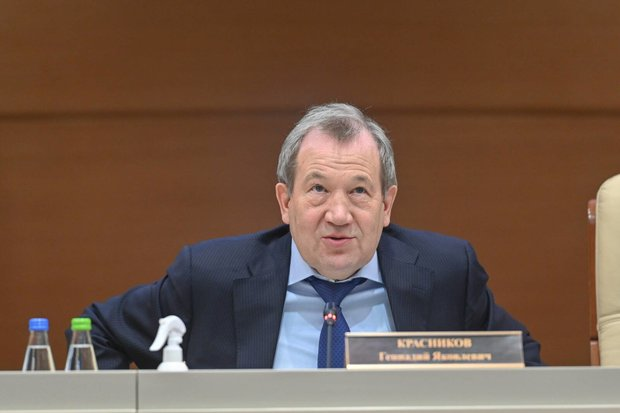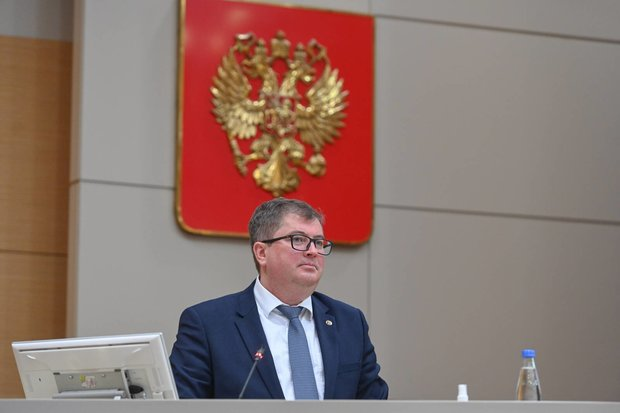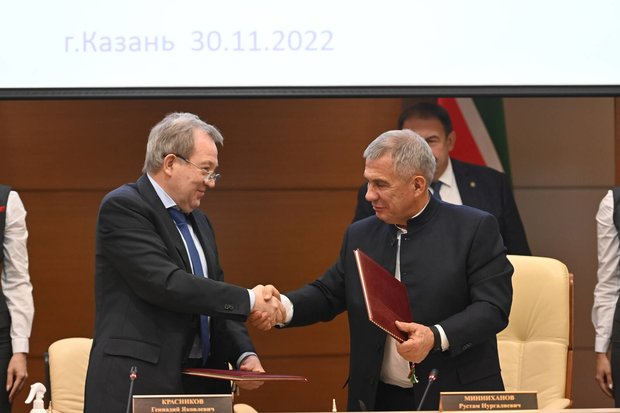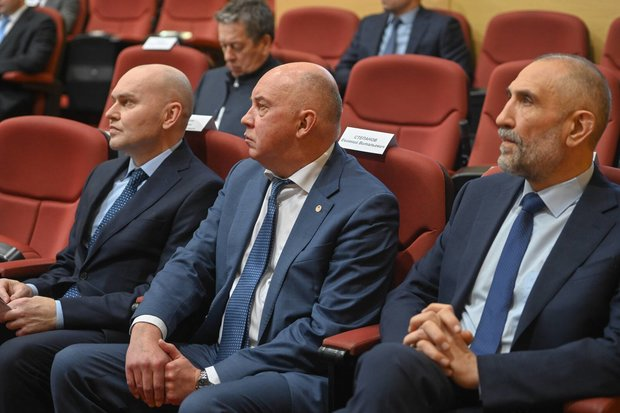Rustam Minnikhanov invites academicians to KAMAZ and Tatneft
The Russian Academy of Sciences could perform the role of the integrator of the scientific centre in the Higher School of Oil in Almetyevsk and the mechanical engineering centre at Kazan Federal University in Naberezhnye Chelny

“If publications in international journalists used to be the main KPI indicators for a scientist, and these articles were often far from what was introduced in our production, now the times are changing,” President of the Russian Academy of Sciences (RAS) Gennady Krasnikov explained the turn of Russian fundamental science to the needs of the economy. Tatarstan also hurries to establish closer contact with the scientific school. In late November, President of the republic Rustam Minnikhanov and the head of RAS signed an agreement on scientific and technological cooperation. The Russian Academy of Sciences can be an integrator of the scientific centre in the Higher School of Oil in Almetyevsk and the mechanical engineering centre at Kazan Federal University in Naberezhnye Chelny that was recently backed by Prime Minister Mikhail Mishustin. “They wanted to link these centres with you,” Minnikhanov voiced his wish at a board meeting of Tatneftekhiminvest-holding. Read more in Realnoe Vremya’s report.
“Now the country is facing serious challenges, they aren’t addressed by standard market methods”
On 30 November, Kazan welcomed the top management of the Russian Academy of Sciences — new President Gennady Krasnikov who was elected in late September and Vice President Stepan Kalmykov who is considered the “main chemist” in the country. At the invitation of the administration of the republic, the new RAS team made a big presentation at the board meeting of Tatneftekhiminvest-holding in the morning and in fact set the agenda. It might seem what big fundamental science of RAS and Tatarstan’s industrial interests that haven’t been great friends have in common. It turned out that the new president of the organisation intends to intensify the cooperation with industrial partners in accordance with priorities of the country’s scientific and technological development amid the external pressure. RAS hasn’t been famous for having close cooperation with the real sector of the economy until recently.
“Now the country is facing serious challenges, they aren’t addressed by standard market methods,” Gennady Krasnikov spoke about the change of the course. “We should perform tasks in a different way. Synergetic work between RAS scientists and the industry must get closer,” he noted. At the same time, according to him, scientists should stop rushing for the Scopus citing index. Their task is to be in demand in performing practical production tasks.
“If publications in international journalists used to be the main KPI indicators for a scientist, and these articles were often far from what was introduced in our production, now the times are changing,” he explained. The head of RAS warned that KPI indicators would change, while when defining state tasks for scientists, they would focus on the solution of real practical problems.”

On the other hand, it is impossible to establish contact with the industry without “creating dedicated consortiums and structures.” They need to be convened so that “scientists and researchers are ready to solve the problems the production has faster and more effectively.”
Academicians for clean air in Nizhnekamsk
RAS is going to cooperate with Tatarstan in chemistry and oil refining. Here young RAS Vice President Stepan Kalmykov who is the dean of Faculty of Chemistry of Moscow State University was given the floor. On his post, he supervises the department of chemistry and new materials. It turned out that the first collaboration between RAS and Tatarstan was in a related area — in ecology. In late April, a delegation of the Russian Academy of Sciences joined an environmental protection consortium where Tatneft was the industrial partner.
According to Kalmykov, within this union, RAS scientists develop new technologies to protect the air. As an example, they put developments catching and concentrating CO2 that is emitted by the Nizhnekamsk CHPP. The RAS scientists are preparing to provide raw data to create a pilot unit to catch exhaust gases of the Nizhnekamsk CHPP. Its productivity will be 20,000 tonnes a year with the capture rate of no less than 95%. Amine solutions and vortex devices are offered to be used to dispose of emissions. Then carbon dioxide gas emissions will be used to make methanol that will be refined at TANECO. And Russian catalysts are going to be used here, which will cheapen the production.

On Tatneft’s request, RAS specialists refine biomasses and plastic. As a result, treated synthetic gas for methanol synthesis is created. The common task is to develop technologies to process biomass and chlorine containing plastics into fuel gas for methanol synthesis. The Institute of Catalysis of the Siberian branch of the Russian Academy of Sciences is the key performer. Also, the Institute of Petrochemical Synthesis of the Russian Academy of Sciences jointly with Tatneft is developing a biooil refining technology. Glue, particle board, plywood are made of them.
Another project was implemented in cooperation with Transneft. In 2019, there was launched a plant making anti-turbulence additives to reduce to oil shipping costs according to RAS’s technology in Alabuga Special Economic Zone. Nika-Petrotek, Transneft, IOS developed the technology.
Higher School of Oil, Mechanical Engineering Centre of KFU and scientific centre in Nizhnekamsk waiting for academicians
After his speech, Rustam Minnikhanov offered not to be limited to the involvement of the academicians in petrochemistry and ecology.
“We see you closely working in environmental topics too,” he noted. “But it is necessary to join priority areas linked with Innopolis. But the most important thing is that RAS could be an integrator of several projects.”
“We want to create the Higher School of Oil in Almetyevsk that will include the oil companies’ specialised institute Tatar Research and Engineering Institute, an educational centre and powerful laboratories. Perhaps, some works need to be defined there,” the Tatarstan president outlined the main centre for the efforts of RAS. “Plus, the republic plans to develop a scientific centre in Nizhnekamsk where SIBUR and Tatneft will be the partners. A mechanical engineering centre at Kazan Federal University in Chelny is the third point.”
After that, Rustam Minnikhanov and the president of the Russian Academy of Sciences signed an agreement on scientific and technological cooperation.

Instantaneously cut off Western cloud
ICL Director General Yevgeny Stepoanov explained what was happening in the IT industry after the exit of Western companies.
“Foreign software producers have left so many company cannot receive support, they cannot update software, buy a licence,” he said.
The Russian subdivision of an international car company (Editor’s note: the name wasn’t made public) turned out in a very difficult situation.
“They used to receive all resources from the Western cloud and instantaneously turned out to be cut off from the possibility of doing their activity,” Stepanov noted.
And Russian products came to the rescue here. According to Yevgeny Stepanov, the team took on the organisation of this cloud. They had to change the network infrastructure it is impossible to service clients without.

Nowadays ICL in partnership with Innopolis SEZ is building a plant to make motherboards for Russian computers and laptops. According to Yevgeny Stepanov, assembly production will open and the conveyor belt will be assembled in the first quarter of 2023, the motherboard production will start in the third quarter. The plant producing up to a million items a year is built on a parcel in Laishevo, which has been included to Innopolis SEZ this year. The total investments in the joint project of Innopolis and ICL group of companies is 2 billion rubles, said Yevgeny Stepanov.